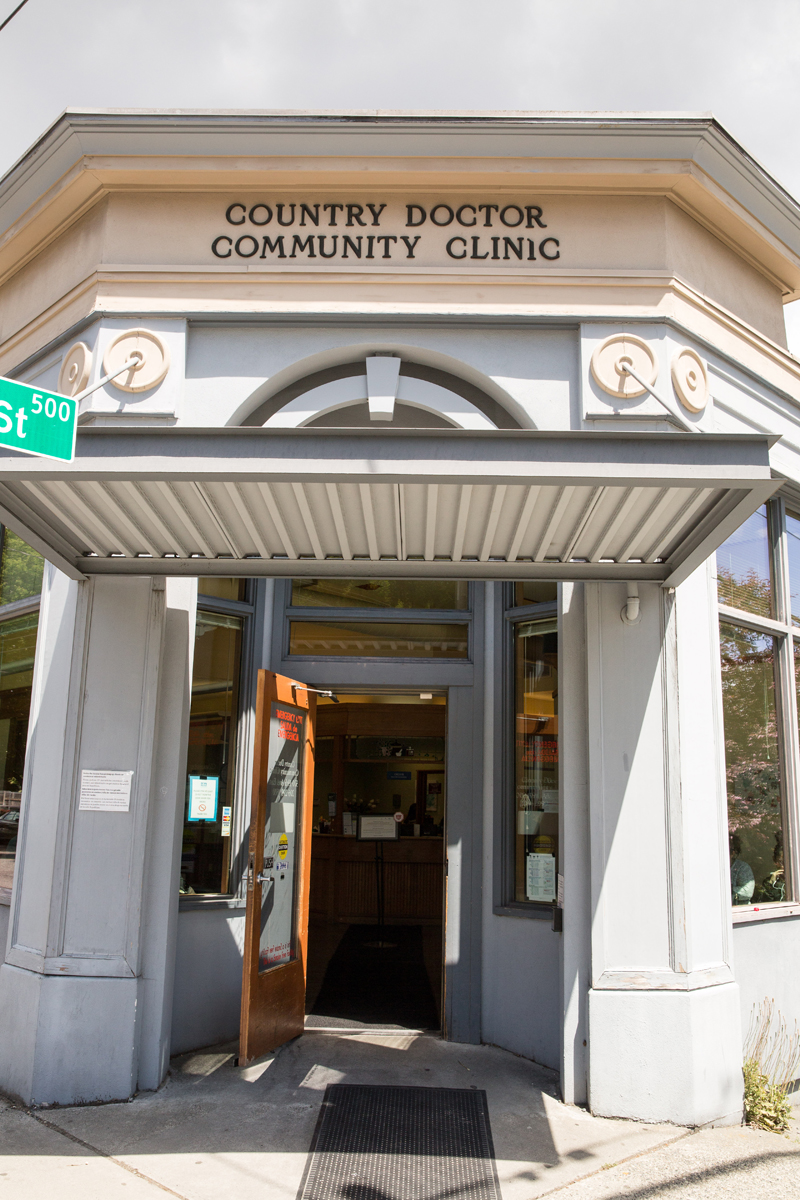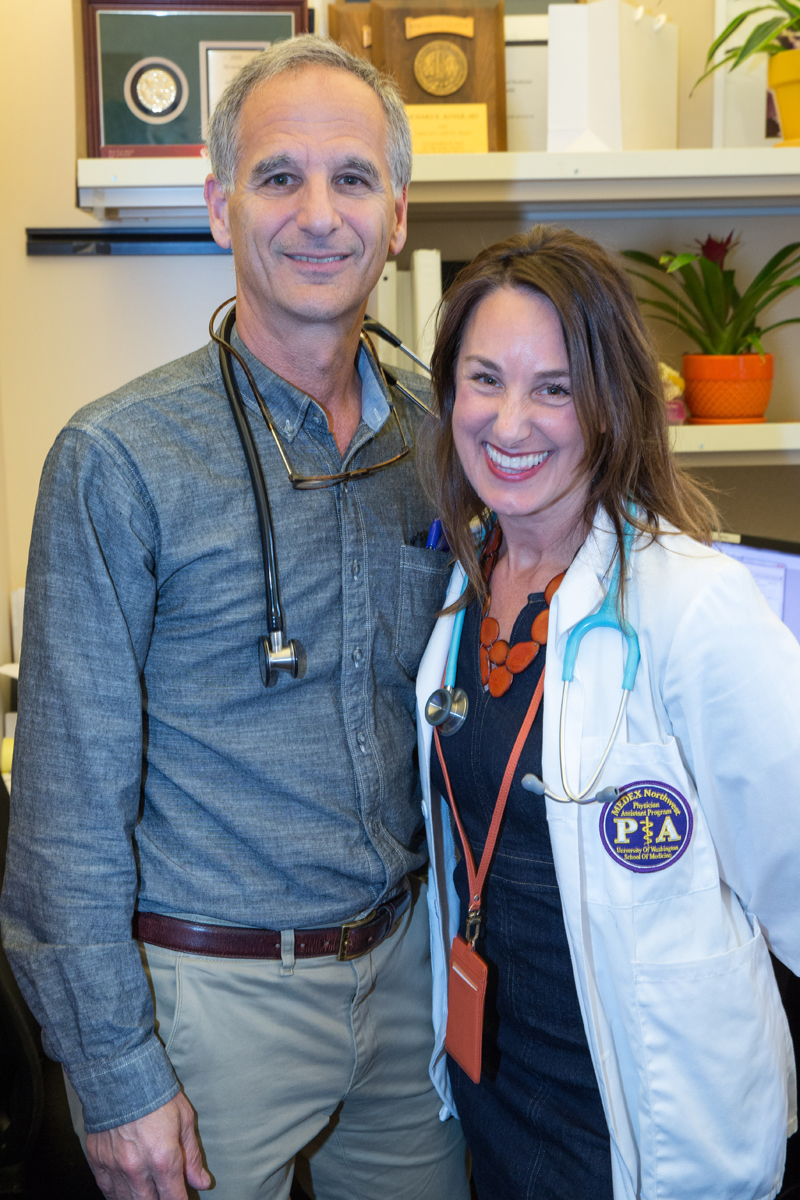Timara Freeman-Young is a single mom raising a 10-year-old son while at the MEDEX Northwest program.
“Actually, I don’t know that I have been raising him during PA school as much as he’s been raising the both of us,” she says. “He’s had to grow up pretty fast. Yeah, he’s a great kid. We’ve also had a lot of help from family and friends.”
Still, there are all sorts of challenges parenting while being in an intensive academic program.
“I’m not home much,” Timara tells us. “And when I am home, I’m usually pretty stressed out, but he’s my number one priority. We figured out ways to make home life feel good in short spurts. We have a lot of kitchen dance parties and we do our homework together. He’s learned to cook. It’s busy but fun.”
Timara admits that she used to being an excellent student.
“I was really proud of that about myself. And in order to be a better parent during school, I’ve had to lower the bar a little bit on myself as a student, and that has been humbling. But then, medicine is humbling. And I think that it’s important that we take these humbling experiences and recognize them for what they are. Because every time a patient comes into an exam room, they’re experiencing that for themselves.”
These insights might lead you to believe that Timara Freeman-Young has a background in psychology, and you’d be right.
Early on Timara knew that she wanted to work with people.
“I knew that I wanted to treat people who were in distress or who needed acute care,” she tells us. “I just didn’t see a path for myself at that time, so I ended up getting my degree in psychology.”
Timara reflects for a moment, then continues. “You know, ultimately, I’m really glad that’s the way my life went because both the degree and the experiences that I got as part of that have led me here.”
With her bachelor’s degree in psychology, Timara worked as a counselor with women who had experienced intimate partner violence. Later, as a youth development specialist for Planned Parenthood, her focus was young women at risk for teen pregnancy along with their families. She describes this work in rural Lewis County as “a marriage between sexuality education and mental health counseling”.
“I’ve had a thousand jobs,” Timara says. But the counseling work with young women in Lewis County took root and paved the way for her future career as a physician assistant. “My initial degrees and education in psychology have not just been relevant, it’s been critical to my role as a PA student, and is a foundational part of my skill set.”
That said, Timara admits there’s a toll taken when working in behavioral health.
“I loved the work, but it was also very emotionally challenging. I had considered medicine straight out of high school so it was at the top of the list when my son was a toddler and I was considering a career change. Behavioral health is deeply rewarding but can feel like an uphill battle. I wanted an occupation where I could see a measurable impact.”
Timara sat down with a career counselor and discussed her life and career goals. “We deconstructed my previous jobs and compiled a list of my interests, skills and strengths.”
The first job the counselor suggested was a PA. And to that, Timara replied, ‘What’s a PA?’”
As she researched the profession it became clear that was the right career path for Timara. She returned to school, got certified as a Medical Assistant, sought out an internship, and then employment with Country Doctor Community Health Centers.
“I had heard about them and loved their work,” she says. “Country Doctor is a really special place.”
Timara has always been drawn to work for organizations that are mission-driven. As a Federally Qualified Health Center (FQHC), Country Doctor embodies an urban underserved mission. In fact, it was founded by community activists 50 years ago to meet the healthcare needs of the poor and marginalized. Country Doctor continues in that tradition today.
“Country Doctor’s first clinic, Carolyn Downs Family Medical Center, was started in part by members of Seattle’s Black Panther Party,” she explains. “They recognized that there wasn’t good medical care for people of color living in Seattle’s Central District.”

Timara continues: “From the beginning, Country Doctor actively sought out folks who don’t otherwise have access to excellent medical care. And they provide care regardless of a person’s ability to pay. Throughout their history, they’ve continued to find pockets of the community who are being left out. Whether that’s refugees or immigrants, those living with HIV or hepatitis or, more recently, people with opioid addiction, they’ve managed to stay current and deeply aligned with the mission.”
When we caught up with Timara, she was at a 4-week clinical rotation back at Country Doctor as part of her final year in MEDEX Seattle Class 51. After working at the clinic as an MA for two years, she’s returned in student status, seeing patients under the watchful eye of familiar providers.
Over the course of her various clinical rotations, Timara has been exposed to areas of medicine apart from family medicine.
“I’ve really opened up to other specialties,” she says.
“I’ve always wanted to work with the underserved,“ she says. “That’s never been a question. Clinical year has been fantastic in that I’ve gotten to rotate with excellent preceptors in multiple areas of medicine. I knew I would like community health but was surprised by how much I enjoyed my other clerkships. I loved emergency, palliative care, inpatient psychiatry, infectious disease, surgery. Honestly, I haven’t met a specialty I didn’t enjoy.”
One of the reasons Timara chose the PA profession was the opportunity for variety.
“You can hone in on a specialty for three to seven years and then you can change, and that is exciting to me.”
“One of the gifts and challenges of the PA profession is the opportunity for variety,” she says. “I thrive in environments where things are constantly changing. It’s also important to me that I get to use both my brain and my heart. I suspect emergency medicine would be a good fit for me because of the inherent variety and fast pace. Long term I can see myself pursuing a more generalist role either as a hospitalist or in internal medicine. Right now, my sights are just set on next year. I’m currently looking into fellowship opportunities so I can deepen my skill set in one area.”
Timara also understands the impediments created by our current healthcare system. On the one hand, she’s seeing family medicine patients who are getting good medical care but are let down by the system in general.
“These are folks who may have an incredible PCP,” she says. “But they also have comorbidities. Maybe their insurance doesn’t cover the services that they actually need. It is not uncommon for an insurer to thinks that a surgery or medicine is unnecessary, when we know it is critical in order for the patient to survive life on the streets.”
On the other hand, there are Americans who have no reasonable access to healthcare.
“We’re seeing patients who cannot get what they need,” she says. “These folks are going to die earlier because they don’t have money and don’t have access. Folks with drug addictions, who want to get sober but don’t have an insurance plan that covers the services they need in order to do so successfully. Others who suffer unnecessarily from manageable conditions because the cost of treatment is prohibitive. Behavioral health services are rarely covered. It’s really discouraging.”
Despite this, Timara has faith that there are some at work subverting these limitations within US healthcare.
“Sometimes providers have to get creative,” she states. “They find ways to get services to folks who really need them. At Country Doctor, if there’s a need in the community and the program doesn’t exist, then they’re ready to go out and make it happen. It’s where medicine, altruism and true social justice meet. And that’s inspiring.”
Timara contends that providers do not have great resources to facilitate lasting behavioral change for patients managing chronic illness. To address this, she’s designing a tool for habit formation.
“We all have opportunities to initiate behavior change in our lives, whether it’s eating better, losing weight or taking our medications,” she says.
That’s the subject of her Capstone Project, a culminating assignment due prior to graduation from MEDEX in August.
“I’m writing a book instead of a Capstone. Story of my life. Try to do it all!”
The average age of the MEDEX student is 30 years. Timara Freeman-Young has gone through the Seattle-based PA education program as an older adult despite hearing others position their age as a limitation.
“When I hear people say, I don’t like what I’m doing but I’m too old to make a career change. I tell them I’m 46 and in school with 25-year-olds who are freaking awesome! We hold this cultural belief that growth and education is supposed to stop in early adulthood. That is a mythology I’m not buying into.”

“We get to choose what we do with our time if we are privileged enough to have our health, our faculties, and resources. So, there’s something I would say to anybody considering becoming a PA, who has this voice that says, ‘Oh, I’m too old, I can’t do it, or learning is going to be impossible.”
“I would say that you can do it. You can do it. Yes, it is hard with the challenges of having a full life outside of school, of having family, of having other things going on. But that’s true for all students. Yes, my memory at 46 is not as sharp as it was 20 years ago. Some days I can’t remember where I left my car keys, let alone a list of inotropes. So, it can take me a little longer to learn things. But the time will pass regardless of how we spend it, so we may as well choose something that gives us joy. Time is no reason to hit the brakes.”

